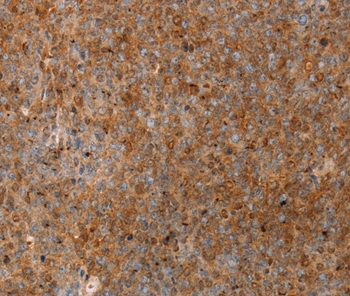
| WB | 咨询技术 | Human,Mouse,Rat |
| IF | 咨询技术 | Human,Mouse,Rat |
| IHC | 1/25-1/100 | Human,Mouse,Rat |
| ICC | 技术咨询 | Human,Mouse,Rat |
| FCM | 咨询技术 | Human,Mouse,Rat |
| Elisa | 咨询技术 | Human,Mouse,Rat |
| Aliases | PAI; PAI2; PAI-2; PLANH2; HsT1201 |
| Entrez GeneID | 5055; |
| Host/Isotype | Rabbit IgG |
| Antibody Type | Primary antibody |
| Storage | Store at 4°C short term. Aliquot and store at -20°C long term. Avoid freeze/thaw cycles. |
| Species Reactivity | Human |
| Immunogen | Fusion protein corresponding to residues near the C terminal of human serpin peptidase inhibitor, clade B (ovalbumin), member 2 |
| Formulation | Purified antibody in PBS with 0.05% sodium azide. |
+ +
以下是关于SERPINB2抗体的3篇参考文献及其摘要概括:
---
1. **文献名称**: *SERPINB2 (PAI-2) Modulates Protease Networks in the Tumor Microenvironment*
**作者**: Schneider, F. et al. (2017)
**摘要**: 该研究利用SERPINB2特异性抗体,通过免疫组化和Western blot分析肿瘤微环境中SERPINB2的表达,发现其通过抑制尿激酶型纤溶酶原激活物(uPA)调控细胞外基质重塑,影响肿瘤侵袭和转移。
2. **文献名称**: *Plasminogen Activator Inhibitor Type 2: A Key Regulator of Cellular Senescence and Apoptosis*
**作者**: Kwaan, H.C. & Mazar, A.P. (2002)
**摘要**: 研究通过SERPINB2抗体检测其在细胞衰老和凋亡中的作用,发现其通过抑制caspase-8和NF-κB通路,在炎症和癌症中发挥双重调控功能。
3. **文献名称**: *Immunolocalization of Plasminogen Activator Inhibitor Type 2 in Human Tissues*
**作者**: Jensen, P.J. et al. (1994)
**摘要**: 该文献首次报道了多克隆SERPINB2抗体的开发,用于免疫荧光和ELISA检测,证实其在角质细胞、胎盘和单核细胞中的高表达,提示其在组织分化和免疫反应中的潜在作用。
---
这些文献涵盖了SERPINB2抗体在肿瘤机制、细胞调控及检测技术中的应用,可作为相关研究的参考。
SERPINB2. also known as plasminogen activator inhibitor type 2 (PAI-2), is a member of the serine protease inhibitor (serpin) superfamily. It regulates proteolytic activity by inhibiting urokinase-type (uPA) and tissue-type plasminogen activators (tPA), which are involved in fibrinolysis, extracellular matrix remodeling, and cell migration. SERPINB2 exists in both intracellular (non-glycosylated) and secreted (glycosylated) forms, with roles in diverse physiological and pathological processes, including inflammation, pregnancy, tumor progression, and viral defense. Its expression is induced by cytokines, growth factors, and cellular stress, often linked to monocyte/macrophage differentiation and epithelial cell responses.
Antibodies targeting SERPINB2 are critical tools for studying its expression, localization, and function. They are widely used in techniques like Western blotting, immunohistochemistry (IHC), and ELISA to investigate SERPINB2's involvement in diseases such as cancer, where it may act as a prognostic marker or modulator of metastasis. In research, these antibodies help clarify SERPINB2's dual roles—promoting cell survival under stress while potentially suppressing tumor invasion by inhibiting protease-dependent pathways. Commercial SERPINB2 antibodies are typically validated for specificity across human and model organism samples, with applications in both diagnostic and basic research contexts.
×